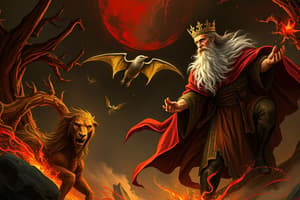Podcast
Questions and Answers
What is the main idea of Chapter One?
What is the main idea of Chapter One?
- Every trip is a quest (except when it's not) (correct)
- Nice to eat with you
- Acts of communion
- It's all political
What is the theme of Chapter Two?
What is the theme of Chapter Two?
Acts of communion
What does Chapter Three focus on?
What does Chapter Three focus on?
Acts of vampires
What is the focus of Chapter Four?
What is the focus of Chapter Four?
What is the main idea of Chapter Five?
What is the main idea of Chapter Five?
What does Chapter Six mention?
What does Chapter Six mention?
What do we learn in Chapter Seven?
What do we learn in Chapter Seven?
What is the focus of Chapter Eight?
What is the focus of Chapter Eight?
What theme does Chapter Nine explore?
What theme does Chapter Nine explore?
What does Chapter Ten reveal?
What does Chapter Ten reveal?
What is discussed in Interlude #1?
What is discussed in Interlude #1?
What is the main idea of Chapter Eleven?
What is the main idea of Chapter Eleven?
What does Chapter Twelve question?
What does Chapter Twelve question?
What does Chapter Thirteen reveal?
What does Chapter Thirteen reveal?
What is the main idea of Chapter Fourteen?
What is the main idea of Chapter Fourteen?
What theme does Chapter Fifteen discuss?
What theme does Chapter Fifteen discuss?
What does Chapter Sixteen focus on?
What does Chapter Sixteen focus on?
What does Chapter Seventeen state?
What does Chapter Seventeen state?
What is the focus of Chapter Eighteen?
What is the focus of Chapter Eighteen?
What does Chapter Nineteen highlight?
What does Chapter Nineteen highlight?
What is the main idea of Chapter Twenty?
What is the main idea of Chapter Twenty?
What is the theme of Interlude #2?
What is the theme of Interlude #2?
What does Chapter Twenty-One focus on?
What does Chapter Twenty-One focus on?
What is the focus of Chapter Twenty-Two?
What is the focus of Chapter Twenty-Two?
What does Chapter Twenty-Three explore?
What does Chapter Twenty-Three explore?
What do we learn in Chapter Twenty-Four?
What do we learn in Chapter Twenty-Four?
What is discussed in Chapter Twenty-Five?
What is discussed in Chapter Twenty-Five?
What theme does Chapter Twenty-Six analyze?
What theme does Chapter Twenty-Six analyze?
What is the focus of Chapter Twenty-Seven?
What is the focus of Chapter Twenty-Seven?
Flashcards are hidden until you start studying
Study Notes
Quest and Communion
- The first chapter introduces the idea that every journey in literature represents a quest, while questioning when this may not apply.
- Chapter two explores the theme of communion through shared meals, indicating deeper connections and relationships among characters.
Vampires and Familiarity
- Chapter three delves into the metaphor of vampires, where characters who drain life or energy symbolize deeper themes of manipulation.
- The fourth chapter discusses familiarity in literature, prompting readers to recognize characters from previous texts.
Literary References
- Chapter five emphasizes the importance of Shakespeare as a reference point in literature, often influencing various narratives and character arcs.
- Chapter six extends this to biblical references, suggesting that many themes and moral lessons can be traced back to scripture.
Fairy Tales and Greek Influence
- Chapter seven plays with fairy tale elements, hinting at the subversion of traditional stories through modern interpretations.
- Chapter eight invokes classical references, asserting that many literary works contain Greek influences and tropes.
Weather as Symbol
- Chapter nine highlights that inclement weather often symbolizes deeper emotional or narrative currents beyond mere meteorology.
- The ten chapter advises readers about the implications of physical proximity to heroes, hinting at character dynamics and plot development.
Interpretation and Violence
- The first interlude raises questions about the intentions behind characters' actions, emphasizing the need for critical thinking.
- Chapter eleven tackles the portrayal of violence in literature and its implications on character development and audience reception.
Symbolism and Politics
- Chapter twelve questions the use of symbols, urging readers to look deeper into their significance within a narrative.
- Chapter thirteen posits that much of literature is inherently political, reflecting societal structures and conflicts.
Christian Imagery and Fantasies
- Chapter fourteen discusses the archetype of Christ figures in literature, noting how characters embody sacrificial elements.
- Chapter fifteen introduces "flights of fancy," symbolizing the imaginative boundaries pushed by characters in fantastical narratives.
Sexual Themes
- Chapter sixteen claims that sexual themes are ubiquitous in literature, while chapter seventeen suggests that some narratives deliberately sidestep explicit sexual content.
Baptism and Geography
- Chapter eighteen posits that when water appears, it often symbolizes baptism; characters undergo transformations or rebirths.
- Chapter nineteen asserts the significance of geography in shaping narratives and character journeys, while chapter twenty adds that seasonal changes affect story arcs and character emotions.
Thematic Unity
- The second interlude suggests that all stories share a common core, reinforcing the idea of universal storytelling.
- Chapter twenty-one emphasizes themes of greatness, indicating some characters are destined for significant roles within their narratives.
Insight and Illness
- Chapter twenty-two delves into character blindness as a narrative device, hinting at deeper truths or themes they cannot perceive.
- In chapter twenty-three, it is highlighted that health issues within stories often signify deeper emotional or social conflicts.
Reading Perspective
- Chapter twenty-four advises against a purely visual approach to literature, recommending a more profound emotional and contextual reading.
- Chapter twenty-five asserts the personal nature of symbols in literature, suggesting that they hold emotional weight and significance for individual readers.
Irony and Complexity
- Chapter twenty-six addresses the use of irony in literature, inviting readers to consider complexity in character motivations and narrative structures.
- Chapter twenty-seven concludes with the concept of test cases in literature, exploring how characters represent broader societal issues or moral dilemmas.
Studying That Suits You
Use AI to generate personalized quizzes and flashcards to suit your learning preferences.




